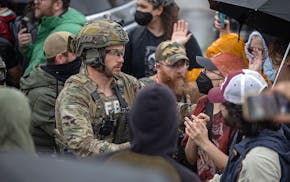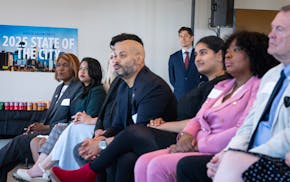Minneapolis City Council Member Emily Koski announced Wednesday she is running for mayor — a job her father, the late Al Hofstede, was elected to in the 1970s after serving on the council.
"Service has always been part of my family's story," Koski said during a morning news conference at the Pearl Park Recreation Center. "My dad devoted his whole life to this city and its people, and I'm proud to carry on that legacy."
Koski said she ran for the council to build bridges in a time of division. Now, she said, the city is at a crossroads: "We're up against efforts to drive wedges between us and pit us against one another. We need a strong, unifying leader to move us forward."
She said Mayor Jacob Frey has been unable to work with the City Council and frames every issue as "us vs. them."
"He has failed to lead us through our toughest challenges," Koski said.
Koski said task forces and work groups have become the mayor's solution to compensate for his lack of vision.
"Somehow, we have become the land of 10,000 work groups," she said. "Thoughts, ideas, and concepts are thrown around to drive up buzz, but there's no vision, no plan, no action."
Koski worked for Target before owning a small business for over a decade.
"We need to rebuild our economy, restore downtown and Uptown and our cultural corridors," she said.
Koski campaigned with Frey in 2021, when she was elected to represent Ward 11 in south Minneapolis, but broke ranks with Frey on his $15 million plan to replenish police ranks; sided with the council's progressive majority in overriding Frey's veto of changes to rideshare regulations; and voted against Frey's proposal to build a new Third Precinct police station downtown.
Sen. Omar Fateh and the Rev. DeWayne Davis, lead minister of Plymouth Congregational Church, have also launched mayoral runs, and Frey has said he plans to run for re-election.
Frey's campaign spokesperson responded, "Over the last two years on the Minneapolis City Council, Emily Koski has changed her position on everything from paying police officers more to regulating Uber and Lyft. Minneapolis voters deserve a clear vision and Mayor Frey will continue to outline his. In the meantime, we look forward to seeing what the Council Member stands for in this election cycle."
The mayor and all 13 City Council seats will be on the ballot in November 2025.
A public safety turning point
Koski touted her role in the creation of the city's first public safety audit division, advocated for "historic base pay raises" and police reforms, and expanded the city's first domestic violence navigators program to help survivors.
"Now more than ever, we need a mayor committed to advancing police reform," Koski said.
She accused Frey of failing to address the police department's staffing crisis by supporting an "outdated, costly and minimally effective" approach. She proposes "relationship recruiting," an expedited hiring process, hiring events, and a benefits package for all first responders that includes housing, child care and educational incentives.
Frey promised to end homelessness
When he first ran for mayor, Frey promised to end homelessness in five years. Instead, it's become intractable.
"His approach isn't working," Koski said. "He has ignored the clear, urgent need to open more shelter beds."
Frey has focused on shutting down homeless encampments, she said, creating an "endless cycle that's inefficient, ineffective, and inhumane."
Frey has defended his record, noting the city has invested $363 million in affordable housing programs since 2018 and doubled the average number of affordable housing units built from the six years before he took office. The Frey campaign says the city is producing 8.5 times more deeply affordable housing than before, to help those struggling with homelessness. Frey has called encampments "dangerous and inhumane" and blamed the fentanyl epidemic for fueling the camps.
Koski said she fought to keep homeless shelters open while Frey "fought to waste time, money, and resources closing encampments, only for them to open up again a block or so away."
Frey opposed the council's funding plan to try to save Agate's downtown homeless shelter, and initially resisted a council-led plan to fund an expansion of Avivo Village, an indoor community that shelters homeless people, although he ultimately signed $1 million in funding for Avivo.
The city should reduce barriers to shelters and transitional housing, she said, dropping sobriety requirements, pet bans and employment and background checks.
The budget
Koski said Frey has proposed the highest property tax levy increase the city has seen in over a decade, and she said the city can't continue to balance its books on the backs of property owners and renters.
She said Frey has no performance metrics and doesn't "make tough decisions" by examining "what's working and what isn't."
Koski harkens back to father's 1977 speech
Koski said she recently re-read a 1977 speech her father gave announcing his re-election campaign. He talked about large property tax bills and the state of the public safety system. He emphasized the importance of affordable housing, and pushed to streamline government.
"I was taken aback by how similar his concerns were then to my concerns now," Koski said.
Her father ended the speech by saying, "Momentum has been stalled — stalled by a government without vision, without leadership, without action. I want to be part of making this city what it can and should be."
"Dad, I couldn't agree more," Koski said.

Two Minneapolis protesters jailed, accused of assaulting officer after restaurant raid

Roper: Plentiful ideas to fix Nicollet Mall show it has a bright future

Fake texts are targeting Minnesota drivers for tickets. Here's what to know.

Gov. Tim Walz confronts rift with labor allies as he mulls third term

